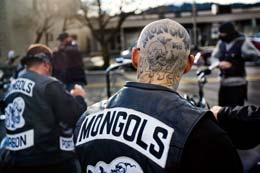BIKER GANGS FLEX MUSCLES IN ASIA

Outlaw Motorcycle Gangs, including some from Canada, are making a big push in Asia and Australia as they seek a piece of the regions underworld drug and criminal empire.
These gangs, already notorious in Canada, the US and Europe are expanding in Asia and the Pacific to augment their power and global grasp on drug supply, in particular methamphetamines, amphetamines and drugs traditionally trafficked in South-East Asia said an intelligence analysis by Europol, the European Union’s law enforcement agency.
Europol said the suspected main driver for outlaw motorcycle gangs (OMCGs) expansion was “the desire to increase their role in particular criminal markets by opening chapters in strategic locations, for instance along the trafficking routes for drugs, weapons and human beings”.
Europol said Rebels and Comanchero from Australia; the Rock Machine from Canada, as well as Mongols and Vagos from the US had arrived in Asia.
The Rock Machine from Canada is ranked by police sources as second only to Hells Angels in Quebec. A long-running turf war with the Angels left more than 150 people dead as the two fought over the lucrative trade in illegal drugs in that province. The war also led to the passage of anti-gang legislation by the federal government.
As the Hells Angels expanded into Ontario, so did the Rock Machine. The organization established three chapters. In 2001, it aligned itself with the Bandidos.
The Bandidos is said to be world’s second-most powerful criminal biker gang, with more than 2,000 members in 14 countries, according to a criminal intelligence report, which describes the Bandidos as a “growing criminal threat.”
The Criminal Intelligence Service Canada describes the Hells Angels as the largest “outlaw motorcycle gang” in the country, with active chapters concentrated mostly in Quebec, Ontario and British Columbia.
Media in Australia said the country already has already has more than 40 outlaw biker gangs, with the largest gangs - the Rebels, the Outlaws, the Hells Angels and the Mongols (formerly the Finks) - having chapters in most states and territories. Another group called The Vagos - also known as “Green Nation” and “Green Hell” are headed for Australia as part of an international expansion of outlaw biker gangs.
A third group called The Rebels, founded in Australia, is undertaking a massive expansion into Europe, North America, Asia and even into Fiji, said a report from newscom.au
Australia’s newly formed 71-member specialist federal anti-gang squad aimed at the growing biker menace in Australia said “at least one gang had an affiliate chapter in Thailand”, despite the fact drug dealing in that country risked the death penalty.
Thailand has chapters of both the Rebels and the Mongols.
The Mongols have already expanded into Malaysia and the Rebels are also in Cambodia and Laos, triggering police fears about drug supply routes to Asia’s golden triangle region.
The Outlaws, which began in the US, are well established here, and in the UK, Europe and Russia.
Australian Federal Justice Minister Michael Keenan said the new anti-gang squad would access national intelligence files on known gang members from the Australian Federal Police, the Australian Crime Commission and the Australian Taxation Office.
The squad will work with state police to control movement across state borders and enforce laws to prevent gangs smuggling in drugs and weapons and members of overseas outlaw chapters entering the country.
However news.com.au understands members from the Mongols gang mother chapter may have already visited Australia ahead of the recent merger with the Finks gang, which some news reports say realised “the Finks goal to go global, giving them respect and a voice on the international stage”.
Coupled with the growth of the existing major gangs, the Hells Angels, Bandidos, Outlaws and a club called Gremium, this has sparked fears of a turf war in Asian nations and Australia.
“Merely establishing a chapter on the ‘turf’ of another OMCG is interpreted as an act of provocation and is likely to result in violent confrontations and retaliation,” Europol said.
“In general, the use of intimidation and violence is intrinsic to the OMCG subculture and serves to exert control over group members and others such as victims of extortion.
“The main threat to public safety associated with OMCGs stems from their propensity to use extreme forms of violence.
“This includes the use of automatic rifles like Kalashnikovs, and explosive devices such as grenades, and the indiscriminate nature with which this violence is often used in open conflicts between rival groups.”
No comments:
Post a Comment
Comments always welcome!